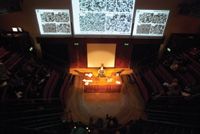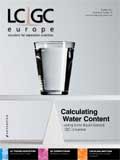Event News
Event news summary
The 16th Desty Memorial Lecture for Innovation In Separation Science
The 16th Desty Memorial Lecture for Innovation In Separation Science will take place in its established home of the Royal Institution of Great Britain on 5 October 2011.
The Royal Institution is used for this gathering, as this was the building that Denis Desty enjoyed above all others. He, like other great scientists, enjoyed the dissemination of science to the widest possible audience and was inspired by the Royal Institution of Great Britain and how for the past two hundred years the institution has been at the centre of scientific research and the popularization of science in England. Within its walls, some of the major scientific discoveries of the last two centuries have been made. These include the discovery of sodium and potassium by Humphry Davy, electromagnetic induction by Michael Faraday, why the sky is blue by John Tyndall, the liquefaction of hydrogen by James Dewar, the structure of benzene by Kathleen Lonsdale under William Henry Bragg and the first enzyme to have its structure determined by David Chilton Phillips under William Lawrence Bragg.

Denis was a passionate communicator and took every opportunity possible to pass on his knowledge and enthusiasm for science. He presented his famous 'Flames are Fun' lecture at the Royal Institution in December 1989, and so fulfilled a much-cherished ambition by standing in the same 'sacred' place as one of his heroes, Michael Faraday.
This year the meeting is dedicated to Raymond Peter William Scott, better known as Ray Scott, who died on 12 February this year aged 86. Ray published over 200 original papers on separation technology. He invented the flame thermocouple detector, the forerunner of the flame ionization detector, pioneered the development of high efficiency packed columns and with A.T. James developed the moving wire detector for liquid chromatography. In 1988 was supposed to retire, but in effect he was working and motivating students until his death. He authored 14 books, all on separation technology, and received numerous awards for his work in chromatography. He — together with his friend Denis Desty — was a founding member of the Chromatography Discussion Group.
This year lectures will be given in honour of Ray by Paul Haddad (University of Tasmania); Ron Majors (Agilent) Pat Sandra (Research Institute for Chromatography) Chris Pohl (Dionex); Kevin Wyndham (Waters); and Jeremy Glennon (University of Cork).
The Royal Institution will open for registration and coffee at 9:30 am with the lectures starting at 10:30 am until 4:30 pm
Tickets for this year's Desty Memorial Lecture are free, but as the Royal Institutions main lecture theatre can only hold 250 people tickets will be allocated on a first booked allocation.The latest update on the lecture can be found at www.desty.org.uk To obtain tickets and for further information contact: Peter Myers, Department of Chemistry, University of Liverpool, Liverpool L69 7ZQ, UK. Tel: +44 151 795 2386, E-mail: peterm@liv.ac.uk
1–4 November 2011
RAFA 2011
Clarion Congress Hotel Prague, Prague, Czech Republic
Organizers: Institute of Chemical Technology, Czech Republic and RIKILT — Institute of Food Safety, The Netherlands
Tel: +420 2 2044 3185
Fax: +420 2 2044 4369
E-mail: RAFA2011@vscht.cz
Website: www.rafa2011.eu/index.html
22–23 November 2011
CE Method Development and Validation Course
Amsterdam, The Netherlands
Organizers: Kantisto BV
Tel: +31 611 419 429
Fax: +31 611 419 429
E-mail: info@kantisto.nl
Website: www.kantisto.nl
30 January–3 February 2012
HTC-12/HTSP-2
Oud-Sint-Jan' Conference Center, Bruges, Belgium
Organizers: Royal Flemish Chemical Society and Royal Society of Chemstry
Tel: +32 92644986
Fax: +32 92649606
E-mail: htc-registrations@ordibo.be
Website: https://www.ordibo.be/htc/
27 May–1 June 2012
36th International Symposium on Capillary Chromatography (Riva 2012) and 9th GC×GC Symposium
Riva del Garda, Italy
Organizers: Luigi Mondello, Chromaleont, University of Messina, Italy
Tel: +39 090-6766536
Fax: +39 090-358220
E-mail: iscc@chromaleont.it
Website: www.chromaleont.it/iscc
Send any event news to Alasdair Matheson at amatheson@advanstar.com
Measuring Vitamin K1 Concentrations in Dogs with Chronic Enteropathy Using LC–MS/MS
May 14th 2025A joint study between the University of Tennessee (Knoxville, Tennessee) and the University of Pennsylvania School of Veterinary Medicine (Philadelphia, Pennsylvania) compared directly measured vitamin K1 (vitK1) concentrations in healthy dogs and dogs with chronic enteropathy (CE) using liquid chromatography tandem mass spectrometry (LC–MS/MS); they also investigated whether supplementation of vitK1 in dogs with CE would significantly increase vitK1 concentrations.
HPLC 2025 Preview: Fundamentally Speaking (Part 2)
May 14th 2025Michael Lämmerhofer from the Institute of Pharmaceutical Sciences, University of Tübingen, Germany, spoke to JFK Huber Lecture Award winner of 2024 Torgny Fornstedt, professor in analytical chemistry and leader of the Fundamental Separation Science Group, Karlstad University, Sweden, about his pioneering work in high performance liquid chromatography (HPLC) with a focus on fundamentals, ion-pair chromatography, and oligonucleotide applications.

.png&w=3840&q=75)

.png&w=3840&q=75)



.png&w=3840&q=75)



.png&w=3840&q=75)










